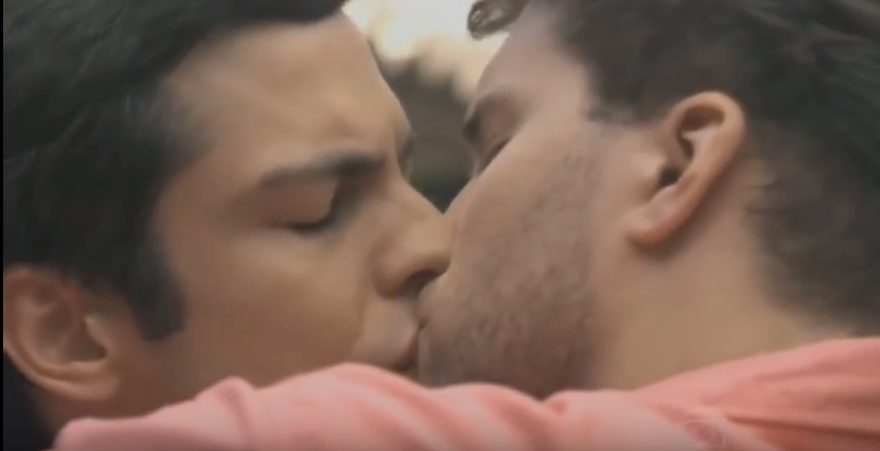The past year’s been a good one for Miami’s gay community – including gay Latinos. In January they held their first LGBT pride event, the GayOcho! Festival, held on one of the city’s most famous streets, Calle Ocho.
It was a big moment for gay Latinos, who hail from a socially conservative culture that can be tough on homosexuality. And it was especially meaningful for the hundreds if not thousands of gay men and lesbians who’ve come here to escape often violent harassment in Latin America.
People like Francesco Duberli, who immigrated to Miami from Colombia 15 years ago after he and the gay support group he founded in Cali were attacked.
“I started getting calls threatening to kill me, and there were two occasions I almost was kidnapped,” Duberli recalls. “One night I went out for dinner, and when I came back, all my employees and all my staff had been attacked and they were tied up, and computers were stolen.”
RELATED: Homophobes Of The Caribbean: Can Gays Change Hearts And Laws On The Islands?
But things seem to have changed in Colombia and South America – dramatically. Last week Colombia’s Supreme Court legalized gay marriage. In fact, while the U.S. legalized same-sex marriage only last summer, Latin American countries started doing it six years ago.
Argentina sanctioned gay matrimony in 2010, followed by Brazil and Uruguay in 2013. In Mexico, where gay marriage has been legal in Mexico City since 2010, the Supreme Court effectively legalized it nationwide last year.
“It is amazing,” says Duberli, who today is a clinical psychologist and head of Survivors Pathway, a support organization for South Florida’s gay and Latino communities. “It is a big change.”
In a globalized society, Colombia is seeing a gay class contributing economically to the country. This idea of gay citizens contributing to society is something new in South America. -Yamil Avivi
Still, you don’t see too many gay pride parades down the major avenues of Latin American capitals. And that’s a reminder that the gay rights strategy in Latin America, where homophobia is perhaps more entrenched, has had to differ from the U.S. approach.
Here, advocates spent years changing hearts and minds in order to change laws. But south of our border, they're altering laws in order to alter attitudes.
Take Colombia. On the one hand, Duberli attributes a lot of the change there to the peace process that's ending a half-century-long civil war.
“I went back to Colombia six months ago,” he says. “You see TV, and they’re talking about civil rights, about inclusion, but also gay, lesbian, bisexual and trans people.”
Gay Colombian-American YamilAvivi sees it too. He’s a doctoral student in American culture at the University of Michigan, but a decade ago he was an immigrant advocate in Miami who authored a study of Colombian LGBTs seeking asylum here.
One big difference Avivi notices now is that Colombia and South America have opened up to the world, thanks largely to the region’s economic boom in the 2000s.
“I think in a globalized society, Colombia is seeing a gay class contributing economically to the country,” says Avivi. “This idea of gay citizens contributing to society is something new there.”
BIG CAVEAT
Yet Avivi and Duberli warn that even if gay people have won legal rights in Latin America, they have yet to win much social respect. Homophobic violence there, for example, remains a serious problem.
“Marriage equality passing,” says Avivi, “brings me back to the question of hate crimes against LGBT folks, who aren’t really being protected.”
Especially transgender folks like Frida Guzman, a Survivors Pathway counselor who came to Miami fleeing harassment in Mexico.
“Mexican machismo,” says Guzman, “is still stronger than Mexican laws.”

As a result, Duberli says the number of LGBTs seeking asylum in the U.S. is still high.
“People keep on coming,” he says, “because shifting cultures is still a work in progress.”
But here’s how changing laws are changing culture in Latin America:
Consider what is arguably the continent’s most influential media platform – the TV soap operas known as telenovelas.
“The novelas haven’t caught up to the reality of what it means to be lesbian or gay, bisexual or transgender,” says Janet Arelis Quezada, a lesbian Dominican-American. She's the Spanish-language media strategist for the gay advocacy group GLAAD in Los Angeles.
“It’s been hit or miss.”
But Quezada says there are more hits than before – and a good example is Brazil, Latin America's largest country..
In May 2013 Brazil legalized gay marriage. That same month the Brazilian TV network Globo began a telenovela called “Amor à Vida.” It featured a gay couple, Félix and Niko.
For the final episode eight months later, the script called for Félix andNiko to kiss – but Globo got cold feet and planned to cut the scene.
“The audience in Brazil actually went to social media and said, ‘You can’t do this,’” says Quezada. “’We’ve been watching this relationship grow, we’re invested in these characters, and so it should be OK for them to kiss.’”
And so kiss they did.



